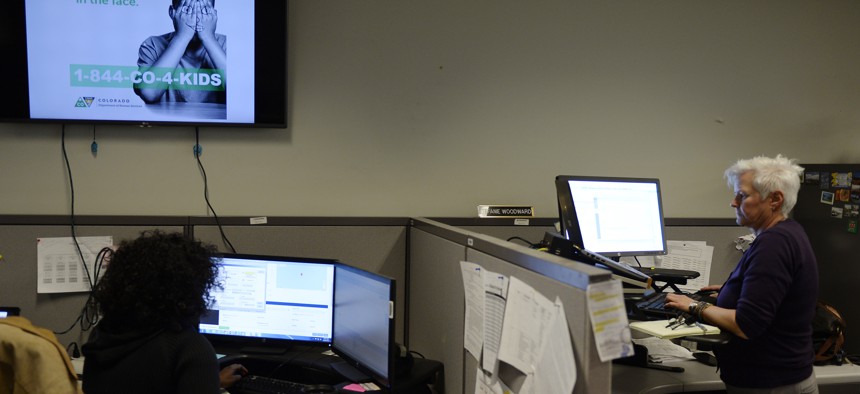Child welfare staffing crisis can only be solved by addressing capacity issues first

Caseworkers at Denver's Department of Human Services man a call center. Cyrus McCrimmon/The Denver Post via Getty Images
COMMENTARY | We need creative solutions to provide enough capacity for caseworkers to complete their work in an effective, timely and efficient way.
Although the nation is emerging from the Covid-19 pandemic, its impact on American families continues. Their struggles are leading to growing demands on child welfare agencies that already lack the staff to handle their existing caseloads. The stakes are high, and we cannot afford short-term solutions or try to hire our way out of the current capacity problem.
We must take a different approach to the child welfare workforce crisis by implementing solutions that increase agency capacity, while also accounting for turnover and vacancy realities that lead to large case backlogs for staff and poor outcomes for families.
Child welfare cases are complex, multidimensional and emotional, with a zero-mistake tolerance level. Every day, dedicated caseworkers navigate family dynamics, insufficient community resources and agency processes to help ensure the safety and well-being of children.
For decades, high staff turnover has plagued the nation’s child welfare system, directly impacting families. The estimated national average turnover rate for child welfare workers is 30%, with individual state agency rates as high as 65%.
The high staff turnover rate is the result of a system that provides neither the time nor resources for staff who face unrealistic, unmanageable and growing caseloads, low compensation, high stress, secondary trauma, work/life balance realities and inadequate management.
Without the time or the required resources, child welfare caseworkers try to juggle both new and old cases, and often end up prioritizing the former to the detriment of the latter. This creates a backlog of unfinished cases that continues to build and takes a mental and emotional toll on both staff and families. Combine these factors with an average child welfare worker salary of $58,000 annually, and it’s no surprise that agencies have difficulties recruiting and retaining staff.
To help solve the problem and mitigate negative consequences, agencies should implement new approaches to align their child welfare practice model with the reality of their available workforce. This could mean matching skills to tasks, where a non-degreed case aide provides administrative support to caseworkers.
Child welfare agencies must also take a closer look at how they manage case flow. They should map out their current processes by each segment of the child welfare continuum (intake, assessment, on-going case management in/out of home, licensing, etc.) to better understand what is working and what is not—and make adjustments based on their observations that support best practices.
If the work is rearranged to minimize wait time, staff will have more time to do their jobs. Additionally, differentiating the workloads and supervision by the type of case, needs of the family, level of safety and risk as well as the experience of the caseworker can also improve efficiency. Technology can also help to automate certain processes by generating reports to help manage workloads and streamlining processes like submitting court reports.
A tech-driven approach can have a profound impact. States that create systems that prioritize complex cases save agency time and taxpayer dollars while promoting the safety and wellbeing of the children and families served. We’ve seen caseload reductions, quicker response times to abuse allegations and fewer children in state care. States deploying solutions that increase staff capacity are generating 80% more capacity and an 85% reduction in assessment/investigation caseloads—with roughly the same overall caseload and personnel.
Child welfare agencies can no longer afford to continue down a path littered with failed solutions and redundant processes that do not address the root capacity crisis—and neither can the nation’s most vulnerable children and families.
Kelly Harder, MSW, is a nationally recognized and accomplished human services leader known in the industry for his work in practice innovation and system transformation. Kelly is currently the Child Welfare Practice Lead for Change & Innovation Agency’s important work in child welfare, helping agencies across the country transform systems and regain the capacity they need to deliver vital services to help children and families and improve outcomes.
NEXT STORY: Solving the problem of understaffed jails and prisons





